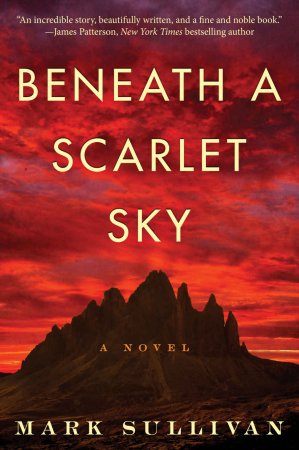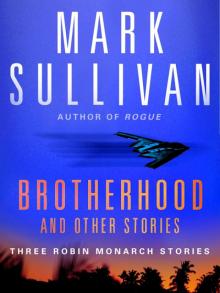- Home
- Mark Sullivan
Beneath a Scarlet Sky Page 22
Beneath a Scarlet Sky Read online
Page 22
the moon. He was thinking about Adolf Hitler. Had that actually been the führer on the phone? He’d sure sounded crazy enough to be Hitler. And that question Leyers had asked of the Fiat manager: Do you know who I am now?
Pino stole a glance at the silhouette of Leyers riding in the backseat and answered in his mind: I don’t know who you are, but I sure know who you work for now.
He’d no sooner had that thought than behind them, to the west, he thought he caught the buzz of some larger engine. He looked in the rearview and side-view mirrors, but saw no slit lights that would indicate an oncoming vehicle. The sound grew louder.
Pino glanced again, seeing General Leyers twisting around, and then something beyond him, something big back there above the trees. The moonlight caught the wings then and the snout of the fighter, its engine a building roar and coming right at them.
Pino slammed on the Daimler’s six brakes. They skidded. The fighter swooped over them like the shadow of a night bird before the pilot could trigger his machine guns and chew up the road out in front of the skidding staff car.
The shooting stopped. The fighter gained altitude and banked to Pino’s left, and then was gone behind the treetops.
“Hold on, mon général!” Pino cried, and threw the vehicle in reverse. He backed up, swung the wheel right, shifted to low range and then first gear, punched off the headlights, and gunned it.
The Daimler went down through the ditch, up the other side, and between a gap in the trees into what looked like a recently plowed field. Pino pulled forward close to the base of a cluster of trees and stopped, clicked the ignition off.
“How did you—?” Leyers began, sounding terrified. “What are you—?”
“Listen,” Pino whispered. “He’s coming back.”
The fighter bore down over the road the same way it had the first time, coming from the west, as if it meant to catch up with the staff car and destroy it from behind. Through the tree branches, Pino couldn’t make it out for several seconds, but then the big silver bird blew by them and up the highway, silhouetted against the rarest of moons.
Pino saw white circles with black centers on the fuselage and said, “He’s British.”
“It’s a Spitfire, then,” Leyers said. “With .303 Browning machine guns.”
Pino started the Daimler, waited, listening, peering. The fighter was making a tighter turn now, coming back above the near tree line six hundred meters ahead of them.
“He knows we’re here somewhere,” Pino said, and then realized the moon was probably glinting off the hood and windshield of the staff car.
He threw the Daimler in gear, tried to bury the left front quarter panel in the thorn thicket growing up around the hedgerow, and stopped when the plane was two hundred meters out. Pino ducked his head, felt the fighter go over them, and took off.
The Daimler chewed up ground, gathering speed, mowing down clods and ruts the entire length of the plowed field. Pino kept looking back, wondering if the plane would make a third pass. Near the far corner of the field, he pulled into another gap in the trees, with the nose of the staff car facing down the bank into the road ditch.
He turned off the engine a second time and listened. The plane was a distant, fading buzz. General Leyers started laughing, and then clapped Pino on the shoulder.
“You’re a natural at the cat-and-mouse game!” he said. “I would not have thought to do any of that, even without being shot at.”
“Merci, mon général!” Pino said, grinning as he started the Daimler and headed east again.
Soon, however, he was conflicted. Part of him was appalled that he had basked once more in the general’s praise. Then again, he had been smart and crafty, hadn’t he? He’d certainly outwitted the British pilot, and he rather enjoyed that.
Twenty minutes later, they crested the hill with the full moon rising before them. Diving out of the night sky, the Spitfire crossed the face of the moon and flew right at them. Pino locked up the brakes. For a second time, the Daimler went into a six-wheel-drive screeching skid.
“Run, mon général!”
Before the staff car had stopped, Pino leaped out the door, took one long off-balance stride, and dove for the ditch even as the Spitfire’s machine guns opened up and sent bullets skipping down the macadam.
Pino landed in the ditch, felt the wind blow out of him as bullets struck steel and broke glass. Chunks of debris peppered his back, and he curled up, protecting his head and struggling for air.
The shooting stopped then, and the Spitfire flew on to the west.
Chapter Twenty
When the plane was a distant hum, and he could breath, Pino whispered in the darkness, “Mon général?”
There was no reply. “Mon général?”
No answer. Was he dead? Pino thought he’d be happy to think that, but instead he saw the downside. No more Leyers, no more spying. No more information for the—
He heard movement and then a groan.
“Mon général?”
“Yes,” Leyers said weakly. “Here.” He was behind Pino, struggling to sit up. “I must have blacked out. Last thing I remember was diving into the ditch and . . . what happened?”
Pino told the general as he helped him up the bank. The Daimler was backfiring, hesitating, and shuddering, but somehow still running. Pino shut it off, and the engine mercifully died. He got the flashlight and tool kit from the trunk. He flicked the light on and passed its beam over the vehicle with General Leyers gaping along with him. Bullets had ripped the Daimler from front to back, penetrating the hood, which was throwing steam. The machine gun had also blown out the windshield, perforated the front and back seats, and punched more holes through the trunk. The front-right tire was flat. So was the opposite side’s outer-rear tire.
“Can you hold this, mon général?” Pino asked, holding out the torch.
Leyers looked at it blankly a moment, and then took it.
Raising the hood, Pino saw that the engine block had been hit five times, but the light .303 rounds had not had enough energy left after piercing the hood to do any real damage. A spark plug cable was severed. Another looked ready to go. And there was a hole high in the radiator. But otherwise the power plant, as Alberto Ascari liked to describe it, looked serviceable.
Pino used a knife to strip and twist together the two pieces of the severed spark plug cable and used first-aid tape to bind it and the weaker cable. He got out the tire kit, found patches and rubber glue that he used to seal both sides of the radiator hole. Then he removed the flat front-left tire, and moved the outer right tire forward to replace it. He took off the flat outer back-left tire and dumped it. When he started the Daimler, it still ran rough, but it was no longer bucking and coughing like an old smoker.
“I think it will get us back to Milan, mon général, but beyond that, who knows?”
“Beyond Milan doesn’t matter,” Leyers said, sounding clearer-headed as he climbed into the backseat. “The Daimler is too visible a target. We will change cars.”
“Oui, mon général,” Pino said, and tried to put the staff car in gear.
It bucked and died. He tried again, gave it more petrol, and got it rolling. But running on four wheels instead of six, the Daimler was no longer balanced, and they went shambling and shivering down the road. Second gear was gone. He had to rev the engine as high as he dared to get to third gear, but once they reached a decent speed, the vibrations calmed a bit.
When they were eight kilometers on, General Leyers asked for his flashlight, fumbled around in his valise, and came up with a bottle. He opened the top, took a gulp, and handed it over the seat. “Here,” he said. “Scotch whiskey. You deserve it. You saved my life.”
Pino hadn’t looked at it that way, and said, “I did what anyone would have done.”
“No,” Leyers said in a scoff. “Most men would have frozen and driven on into the machine guns, and died. But you—you were not afraid. You kept your wits about you. You are what I used to
call ‘a young man of action.’”
“I like to think so, mon général,” Pino said, basking once more in Leyers’s praise as he took the bottle and had a swig. The liquid spread hot through his belly.
Leyers took the bottle back. “That’s enough for you until Milan.”
The general chuckled. Over the vibrations in the Daimler, Pino heard Leyers take several more belts of the scotch straight off the bottle.
Leyers laughed sadly. “In some ways, Vorarbeiter Lella, you remind me of someone. Two people, actually.”
“Oui, mon général?” Pino said. “Who are they?”
The Nazi was quiet, took a sip, and then said, “My son and my nephew.”
Pino hadn’t expected that.
“I did not know you had a son, mon général,” Pino replied, and glanced in the mirror, seeing nothing but the suggestion of the man in the shadows of the backseat.
“Hans-Jürgen. He’s almost seventeen. Smart. Resourceful, like you.”
Pino didn’t know exactly how to react, so he said, “And your nephew?”
There was a moment of silence before Leyers sighed and then said, “Wilhelm. Willy, we called him. My sister’s son. He served under Field Marshal Rommel. Died at El Alamein.” He paused. “For some reason, his mother blames me for the loss of her only child.”
Pino could hear the pain in Leyers’s voice and said, “I’m sorry to learn that, mon général. But your nephew served with Rommel, the Desert Fox.”
“Willy was a young man of action,” the general agreed in a hoarse voice before taking a drink. “He was a leader who sought harm’s way. And it cost him his life at twenty-eight, in the middle of a flea-infested Egyptian desert.”
“Did Willy drive a tank?”
Leyers cleared his throat and said, “With the Seventh Panzers.”
“The Ghost Division.”
General Leyers cocked his head. “How do you know of these things?”
The BBC, Pino thought, but figured that would not go over well. So he said, “I read all the papers. And there was a newsreel at the cinema.”
“Reading newspapers,” Leyers said. “A rare thing for someone so young. But both Hans-Jürgen and Willy read all the time, especially the sports sections. We used to go watch sports together. Willy and I saw Jesse Owens run at the Berlin Olympic Games. Fantastic. How angry the führer was that day when a black man bested our best. But Jesse Owens? Vorarbeiter, that Negro was a physical genius. Willy kept saying that, and he was right.”
He fell off into silence, pondering, remembering, mourning.
“Do you have other children?” Pino asked at last.
“A young daughter, Ingrid,” he said with renewed brightness.
“Where are they? Hans-Jürgen and Ingrid?”
“In Berlin. With my wife, Hannelise.”
Pino nodded and focused on driving while General Leyers continued to drink the scotch at a slow but steady pace.
“Dolly’s a dear friend,” Major General Leyers announced sometime later. “I’ve known her a long time, Vorarbeiter. I like her a great deal. I owe her a great deal. I look out for her, and I always will. But a man like me doesn’t leave his wife to marry a woman like Dolly. It would be like an old goat trying to cage a tigress in her prime.”
He laughed with admiration and some bitterness before drinking again.
Pino was shocked that Leyers was opening up to him this way after eight weeks of maintaining a cold reserve, and with the difference in rank and age. But he wanted the general to keep talking. Who knew what he might let slip next?
Leyers fell into silence, sipping the booze once more.
“Mon général?” Pino said finally. “May I ask you a question?”
Leyers’s tongue sounded thick when he said, “What is it?”
Pino slowed at an intersection, winced at the Daimler backfiring, and then glanced in the rearview before saying, “Do you really work for Adolf Hitler?”
For what seemed like an eternity, Leyers said nothing. Then he replied in a slight slur, “Many, many times, Vorarbeiter, I have sat at the left hand of the führer. People say there is a bond between us because both our fathers worked as customs inspectors. There is that. But I am a man who gets things done, a man to depend on. And Hitler respects that. He does, but . . .”
Pino glanced in the rearview and saw the general taking another draw on the scotch.
“But?” Pino said.
“But it is a good thing I am in Italy. If you stay too close to someone like Hitler, you are going to burn someday. So I keep my distance. I do my work. I earn his respect, and nothing more. Do you see?”
“Oui, mon général.”
Four or five minutes passed before General Leyers took another swig and said, “I am an engineer by training, Vorarbeiter. I have my doctorate. From the beginning, as a younger man, I worked for the government in armaments, awarding contracts. Millions upon millions of kronen. I learned how to negotiate with great men, industrialists like Flick and Krupp. And because of that, men like Flick and Krupp owe me favors.”
Leyers paused, and then said, “I will give you some advice, Vorarbeiter. Advice that could change your life.”
“Oui, mon général?”
“Doing favors,” Leyers said. “They help wondrously over the course of a lifetime. When you have done men favors, when you look out for others so they can prosper, they owe you. With each favor, you become stronger, more supported. It is a law of nature.”
“Yes?” Pino said.
“Yes,” Leyers said. “You can never go wrong in this way, because there will be times when you will need a favor, and it will be right there waiting to come to the rescue. This practice has saved me more than once.”
“I will keep that in mind.”
“You are a smart boy, just like Hans-Jürgen,” the general said, and laughed. “Such a simple, simple thing, the doing of favors, but because of them, I lived well before Hitler, I’ve lived well under Hitler, and I know I’ll live well long after Hitler is gone.”
Pino glanced at the mirror and saw Leyers’s dark silhouette as he drained the scotch bottle. “One last piece of advice from a man older than his years?”
“Oui, mon général?”
“You never want to be the absolute leader in the game of life, the man out front, the one everyone sees and looks to,” Leyers said. “That’s where my poor Willy made his mistake. He got out front, right there in the light. You see, Vorarbeiter, in the game of life, it is always preferable to be a man of the shadows, and even the darkness, if necessary. In this way, you run things, but you are never, ever seen. You are like a . . . phantom of the opera. You are like . . .”
The scotch bottle fell to the floor. The general cursed softly. A moment later, with his arms wrapped around his valise, using it like a pillow, he began to snorfle, choke, snore, and fart.
When they reached Dolly’s apartment building, it was almost midnight. Pino left the comatose general in the Daimler, and left the staff car running for fear it might never start again. He ran through the lobby, past the crone’s empty stool, and up the stairs to Dolly’s. Anna did not answer until the third series of knocks.
Dressed for bed in her nightgown and robe, Anna looked weary and lovely.
“I need Dolly,” he said.
“What’s happened?” Dolly said, coming down the hall in a black-and-gold dressing gown.
“The general,” Pino said. “He’s had too—”
“Too much to drink?” General Leyers said, coming in through the open door, valise in hand. “Nonsense, Vorarbeiter. I’m having another drink, and so are you. Will you join us, Dolly?”
Pino stared at Leyers as if he were Lazarus arisen. As the general passed Pino, his breath was foul with alcohol, and his eyes looked like they were bleeding, but he wasn’t slurring his words or weaving on his feet at all.
“What are we celebrating, Hans?” Dolly said, brightening. Anna had said she was always up for a party.
&n
bsp; “The blue moon,” the general said, setting down the valise. He kissed her lustily before throwing his arm around her shoulder and looking back at Pino. “And we are celebrating the fact that Vorarbeiter Lella saved my life, and that deserves a drink!”
He spun Dolly around the corner into the living area.
Anna looked at Pino with a puzzled smile on her face. “Did you?”
“I saved myself,” Pino whispered. “He kind of came along for the ride.”
“Vorarbeiter!” Leyers yelled from the other room. “A drink! And fair Anna, too!”
When they entered the living room, the general was beaming and holding out generous tumblers of whiskey. Dolly was already gulping hers. Pino didn’t know how Leyers was still standing, but the general took a draw of the liquor and launched into a blow-by-blow description of what he called “the Once-in-a-Blue-Moon Duel between the Sneaky Pilot in the Spitfire and the Daring Vorarbeiter in the Daimler.”
Dolly and Anna were on the edge of their seats as Leyers recounted the Spitfire’s final return and Pino’s locking up the brakes and shouting at him to run. And the machine guns and the Daimler’s near destruction.
General Leyers raised his glass at the end of his story and said, “To Vorarbeiter Lella, who I owe a favor or two.”
Dolly and Anna clapped. Pino’s face felt flushed from the attention, but he smiled and raised his glass in return. “Thank you, General.”
A loud rapping came at the door to the apartment. Anna set her glass down and went to the hallway. Pino went with her.
When the maid opened the door, the old crone, the building concierge, was there in her ragged nightclothes, holding a candle lantern.
“Your neighbors can’t sleep for all the hell-raising,” she scolded, blinking behind her glasses. “There’s a lorry or something backfiring out on the street, and you’re carrying on drunk in the middle of the night!”
“I forgot,” Pino said. “I’ll go right down and turn the car off.”
Dolly and Leyers appeared at the head of the hallway.
“What is happening?” Dolly asked.
Anna explained, and Dolly said, “We’re all going to bed now, Signora Plastino. Sorry to have kept you up.”
The crone made a harrumphing noise and, still indignant, turned away, holding the candle lantern high, dragging the filthy hem of her nightgown behind her, and groping her way down the staircase. Pino followed her at a safe distance.
After he turned off the staff car’s engine, and after a very drunk General Leyers and Dolly had retired to their bedroom, he was at last alone again with Anna in the kitchen.
She warmed up a sausage, broccoli, and garlic dish and poured him a glass of wine and one for herself. Then she sat opposite him, chin in her hand, and asked him questions about the fighter plane and what it felt like to be shot at, to have someone trying to kill him.
“It felt scary,” he said after thinking about it for a moment between bites of the delicious meal. “But I was more scared afterward, when I’d had a chance to think about it. Everything was happening so fast, you know?”
“No, and I don’t want to know, not really. I don’t like guns.”
“Why?”
“They kill people, and I’m a people.”
“Lots of things kill people. Are you frightened of mountain climbing?”
“Yes,” she said. “Aren’t you?”
“No,” Pino said, drinking his wine. “I love mountain climbing, and skiing.”
“And dueling with airplanes?”
“When it’s called for,” he said, and grinned. “This is fantastic, by the way. You really are a great cook.”
“Old family recipe, and thank you,” Anna said, rolling her shoulders forward and studying his face. “You’re full of surprises, you know.”
“Am I?” Pino asked, pushing the plate back.
“I think people underestimate you.”
“Good.”

 Beneath a Scarlet Sky
Beneath a Scarlet Sky The Last Green Valley
The Last Green Valley Beneath a Scarlet Sky: A Novel
Beneath a Scarlet Sky: A Novel Brotherhood and Others
Brotherhood and Others The Purification Ceremony
The Purification Ceremony